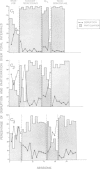Abstract
Classroom peers can serve as powerful sources of reinforcement in increasing or maintaining both the positive and negative behaviors of their classmates. In two experiments, we examined the effectiveness of a peer-monitored token system on reducing disruption and nonparticipation during a transition period of a kindergarten class for behaviorally impaired children. Additionally, the effect of providing and subsequently withholding corrective feedback to peer mediators on the accuracy of their point awards was evaluated. Results in Experiment 1 suggest that both teacher- and peer-monitored interventions were successful in decreasing disruption and increasing participation of monitored peers. Experiment 2 further demonstrated that peer monitors could successfully initiate the token system without prior adult implementation. Analysis of the point awards in both experiments indicates that peer monitors consistently awarded points that were earned. However, when corrective feedback was withdrawn the peer monitors frequently awarded points that were not earned, i.e., they rarely withheld points for undesirable behavior. Even so, the monitored peers' disruptive behavior was maintained at low rates.
Full text
PDF














Images in this article
Selected References
These references are in PubMed. This may not be the complete list of references from this article.
- Christy P. R. Does use of tangible rewards with individual children affect peer observers? J Appl Behav Anal. 1975 Summer;8(2):187–196. doi: 10.1901/jaba.1975.8-187. [DOI] [PMC free article] [PubMed] [Google Scholar]
- Cooke T. P., Apolloni T. Developing positive social-emotional behaviors: a study of training and generalization effects. J Appl Behav Anal. 1976 Spring;9(1):65–78. doi: 10.1901/jaba.1976.9-65. [DOI] [PMC free article] [PubMed] [Google Scholar]
- Dineen J. P., Clark H. B., Risley T. R. Peer tutoring among elementary students: educational benefits to the tutor. J Appl Behav Anal. 1977 Summer;10(2):231–238. doi: 10.1901/jaba.1977.10-231. [DOI] [PMC free article] [PubMed] [Google Scholar]
- Egel A. L., Richman G. S., Koegel R. L. Normal peer models and autistic children's learning. J Appl Behav Anal. 1981 Spring;14(1):3–12. doi: 10.1901/jaba.1981.14-3. [DOI] [PMC free article] [PubMed] [Google Scholar]
- Greenwood C. R., Sloane H. N., Baskin A. Training elementary aged peer behavior managers to control small group programmed mathematics. J Appl Behav Anal. 1974 Spring;7(1):103–114. doi: 10.1901/jaba.1974.7-103. [DOI] [PMC free article] [PubMed] [Google Scholar]
- Johnson M., Bailey J. S. Cross-age tutoring: fifth graders as arithmetic tutors for kindergarten children. J Appl Behav Anal. 1974 Summer;7(2):223–232. doi: 10.1901/jaba.1974.7-223. [DOI] [PMC free article] [PubMed] [Google Scholar]
- Maloney D. M., Harper T. M., Braukmann C. J., Fixsen D. L., Phillips E. L., Wolf M. M. Teaching conversation-related skills to predelinquent girls. J Appl Behav Anal. 1976 Fall;9(3):371–371. doi: 10.1901/jaba.1976.9-371. [DOI] [PMC free article] [PubMed] [Google Scholar]
- Parson L. R., Heward W. L. Training peers to tutor: evaluation of a tutor training package for primary learning disabled students. J Appl Behav Anal. 1979 Summer;12(2):309–310. doi: 10.1901/jaba.1979.12-309. [DOI] [PMC free article] [PubMed] [Google Scholar]
- Phillips E. L., Phillips E. A., Wolf M. M., Fixsen D. L. Achievement Place: development of the elected manager system. J Appl Behav Anal. 1973 Winter;6(4):541–561. doi: 10.1901/jaba.1973.6-541. [DOI] [PMC free article] [PubMed] [Google Scholar]
- Ringer V. M. The use of a "token helper" in the management of classroom behavior problems and in teacher training. J Appl Behav Anal. 1973 Winter;6(4):671–677. doi: 10.1901/jaba.1973.6-671. [DOI] [PMC free article] [PubMed] [Google Scholar]
- Robertson S. J., Dereus D. M., Drabman R. S. Peer and college-student tutoring as reinforcement in a token economy. J Appl Behav Anal. 1976 Summer;9(2):169–177. doi: 10.1901/jaba.1976.9-169. [DOI] [PMC free article] [PubMed] [Google Scholar]
- Solomon R. W., Wahler R. G. Peer reinforcement control of classroom problem behavior. J Appl Behav Anal. 1973 Spring;6(1):49–56. doi: 10.1901/jaba.1973.6-49. [DOI] [PMC free article] [PubMed] [Google Scholar]
- Strain P. S., Shores R. E., Kerr M. M. An experimental analysis of "spillover" effects on the social interaction of behaviorally handicapped preschool children. J Appl Behav Anal. 1976 Spring;9(1):31–40. doi: 10.1901/jaba.1976.9-31. [DOI] [PMC free article] [PubMed] [Google Scholar]
- Strain P. S., Shores R. E., Timm M. A. Effects of peer social initiations on the behavior of withdrawn preschool children. J Appl Behav Anal. 1977 Summer;10(2):289–298. doi: 10.1901/jaba.1977.10-289. [DOI] [PMC free article] [PubMed] [Google Scholar]
- Trovato J., Bucher B. Peer tutoring with or without home-based reinforcement, for reading remediation. J Appl Behav Anal. 1980 Spring;13(1):129–141. doi: 10.1901/jaba.1980.13-129. [DOI] [PMC free article] [PubMed] [Google Scholar]





